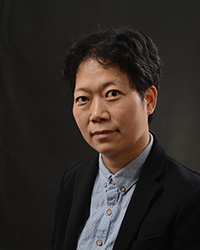Zhijun ZHANG




Zhijun ZHANG
Zhijun Zhang, associate professor, School of Biomedical Engineering, Shanghai Jiaotong University. In 2008, she obtained Ph.D in neurobiology from the Institute of neuroscience, Chinese Academy of Sciences. Under the guidance of academician Shumin Duan, she mainly focused on the research of glial cells function, and published the first author's article in the international top journal Nature Cell Biology. From 2009 to 2012, she conducted postdoctoral research in the University of California, San Francisco and the University of Massachusetts School of medicine, and mastered the cell culture technique of Induced pluripotent stem cells. Since 2013, Her research focused on the role of glial cells in the pathogenesis and treatment of stroke. She has got grants from National Natural Science Foundation of China, Shanghai Municipal Science and Technology Commission etc, and published more than 20 important academic papers in important foreign academic journals, including Nature Cell Biology, molecular cell, science, neuron and PNAS, and has more than 2000 citations. She participated in the book writing of translational research in stroke and other medical monographs. In 2015, she won the second prize of Shanghai Natural Science Award (the fourth) and the second prize of Natural Science Award (the fourth) of the Ministry of education in 2013.
1993-1998 Bachelor - Xinxiang Medical College
1999-2002 Master degree - Central South University
2003-2008 Ph.D. - Chinese Academy of Sciences
2002-2003, research assistant,Lab of Synapse Development and Plasticity,Institute of Neuroscience, Chinese Academy of Sciences, Shanghai, China
2009-2012, Postdoctoral Fellow, Gladstone Institute of Neurological Disease, University of California, San Francisco; and Department of Neurology, University of Masschusetts Medical School
2008-2015, Assistant professor, Med-X Research Institute of Shanghai Jiao Tong University
2016-present, Associate professor, Med-X Research Institute of Shanghai Jiao Tong University
Cerebrovascular diseases
Natural Science Award of the Ministry of education, 2013 (the fourth)
Shanghai Natural Science Award, 2015 (the fourth)
Member of Editorial Board, Frontiers-Neuroscience (2020-present);
Introduction to Biomedicine - (Aut)
Induced pluripotent stem cell - BME8305 (Spr)
1. Li Z, Song Y, He T, Wen R, Li Y, Li Y, Chen T, Huang S, Wang Y, Tang Y, Shen F, Tian HL, Yang GY, Zhang Z. M2 microglial small extracellular vesicles reduce glial scar formation via the miR-124/STAT3 pathway after ischemic stroke in mice. Theranostics 2021;11(3):1232-1248.
2. Cai H, Ma Y, Jiang L, Mu Z, Jiang Z, Chen X, Wang Y, Yang GY, Zhang Z. Hypoxia Response Element-Regulated MMP-9 Promotes Neurological Recovery via Glial Scar Degradation and Angiogenesis in Delayed Stroke. Mol Ther. 2017;25(6):1448-1459
3. Wen RX, Shen H, Huang SX, Wang LP, Li ZW, Peng P, Mamtilahun M, Tang YH, Shen FX, Tian HL, Yang GY, Zhang ZJ. P2Y6 receptor inhibition aggravates ischemic brain injury by reducing microglial phagocytosis. CNS Neurosci Ther. 2020;26(4):416-429.
4. Lu Y*, Zhang Z*, Sun D, Sweeney ST, Gao FB. Syntaxin 13, a genetic modifier of mutant CHMP2B in frontotemporal dementia, is required for autophagosome maturation. Mol Cell. 2013;52(2):264-71. (*co-first author)
5. Zhang Z*, Chen G*, Zhou W*, Song A, Xu T, Luo Q, Wang W, Gu XS, Duan S. Regulated ATP release from astrocytes through lysosome exocytosis. Nat Cell Biol. 2007, 9:945-953.
6. Ge W*., Yang X*., Zhang Z., Wang H., Deng Q., Duan S. Long-Term Potentiation of Neuron-Glia Synapses Mediated by Ca2+-Permeable AMPA Receptors. Science. 2006;312, 1533-1537.